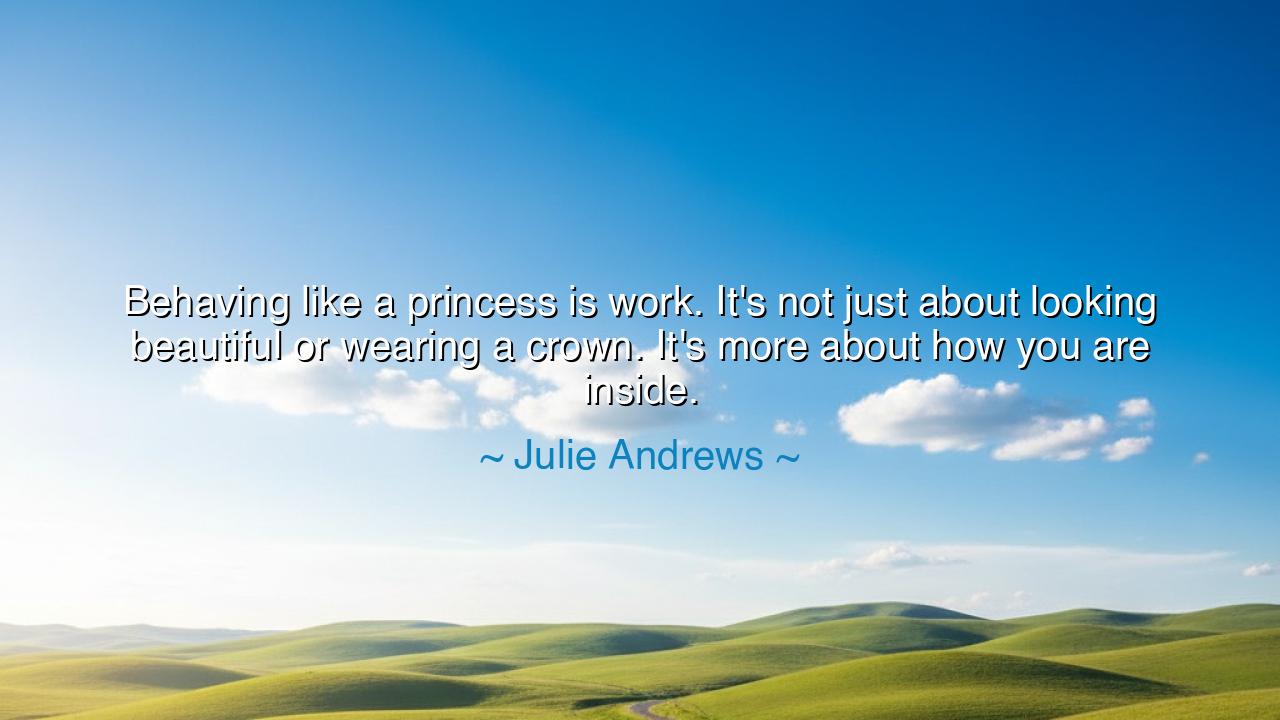
Behaving like a princess is work. It's not just about looking
Behaving like a princess is work. It's not just about looking beautiful or wearing a crown. It's more about how you are inside.






The words of Julie Andrews—“Behaving like a princess is work. It’s not just about looking beautiful or wearing a crown. It’s more about how you are inside”—speak with the timeless resonance of virtue over appearance. They remind us that true nobility is not a garment worn, but a spirit cultivated, and that the radiance of character outweighs the glitter of jewels.
The ancients knew well that the essence of rulership lay not in ornament, but in duty. A crown could be forged of gold, yet without wisdom and compassion within the bearer, it was but an empty symbol. Thus, Andrews declares that the path of a princess—and indeed of any who lead—demands work, the daily labor of patience, kindness, courage, and integrity.
To be merely beautiful is fleeting, for the eye is easily deceived by surface shine. But to be steadfast in virtue, to hold dignity and grace even in hardship—this is the beauty that endures beyond age and beyond fashion. The ancients called it the beauty of the soul, that which blossoms not in mirrors but in deeds.
Her teaching reminds us that the true weight of a crown is invisible. It rests in responsibility, in the quiet choices made when none are watching, in the capacity to uplift others rather than to exalt oneself. To rule or to inspire without such inner strength is to falter, but with it, even the humblest may shine as royalty.
So let this wisdom be handed down: if you would be as a princess, forget not that it is a calling of the inside, not the outside. Cultivate the virtues of heart and spirit, and let the crown be but a symbol of what already dwells within. For the truest nobility is not worn, but lived.






LPLy Pham
Julie Andrews’ words remind us that true elegance comes from within. It makes me wonder—how can we teach the younger generation that inner qualities are just as important, if not more so, than outer beauty? In a world where external appearance often takes the spotlight, how do we nurture a sense of self-worth that comes from one’s character rather than just their looks?
TT41. Ha Thi Tram
This quote challenges the stereotypical view of what it means to be a ‘princess.’ It’s not about the crown or the beauty, but the character and actions behind it. But is this idea of ‘princess-like’ behavior exclusive to women, or can it be applied to anyone striving to embody kindness and integrity? How can we redefine the concept of ‘royalty’ to include these virtues without relying on outdated gender roles?
YNYen Nhi
I love how Julie Andrews highlights the deeper essence of being a ‘princess.’ It’s easy to get caught up in the idea of beauty and outward perfection, but the real work lies in cultivating character. What does it mean to behave like a princess in the everyday sense? How do we incorporate those qualities of grace, dignity, and kindness into our daily interactions and decisions?
GDGold D.dragon
Julie Andrews’ quote makes me think about how being a ‘princess’ isn’t just about external appearances or status. It’s about inner qualities like kindness, grace, and humility. But how often do we forget that? In today’s world, so much emphasis is placed on how we look or how we present ourselves. How can we shift the focus back to inner values and let that define who we are, rather than external attributes?